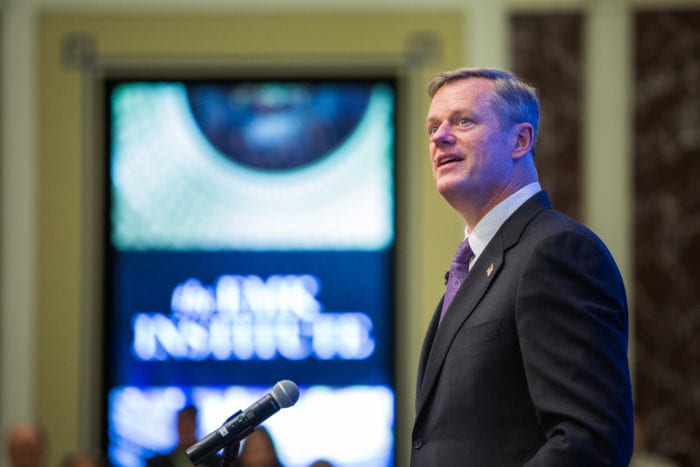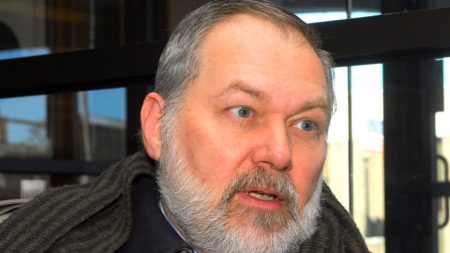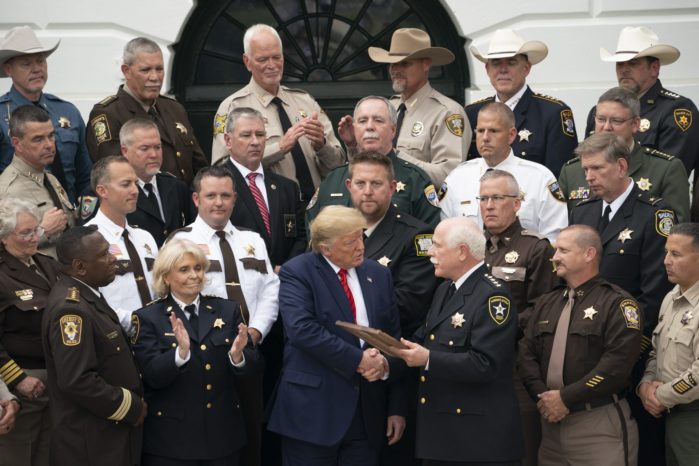
Mass Republicans double down on Trump, limp toward November and obscurity
Massachusetts is a blue state. Democrats occupy every US House and Senate seat and have controlled both chambers of the State House since World War II. Mass Republicans have sent just two members to the House since the 1970s, and only once since the Great Depression have the majority of Bay Staters voted for a Republican presidential candidate.
But in the aftermath of the Republican Party’s 2016 triumph, which gave the national brand control of the House, Senate, and presidency, conservatives in the Commonwealth are seeing their already limited power evaporate.
A brief glance at the Commonwealth’s political outlook doesn’t paint too dire a picture for Republicans. With Gov. Charlie Baker occupying the corner office, Republicans control a branch of state government, denying the Democrats a legislative trifecta. Controlling the executive is no fluke; over the past 30 years, Mass has elected just one Dem to the governorship.
Baker is also popular. He is frequently ranked as one of the most highly regarded US politicians among their constituents, and a May UMass-Lowell poll found the second-term governor to be enjoying an approval rating above 70%.
Scratching a bit deeper beneath the surface, however, it becomes clear that whatever conservative movement exists in the Bay State is shrouded in disarray on the heels of multiple election cycles of defeat. Aside from Baker’s success, Republicans have failed to make significant inroads in the Commonwealth—even as the party enjoyed a strong run from 2009 through 2016.
In practice, progressive ballot initiatives have passed, while conservative ones failed over the past two cycles. Since 2018, Dems have surged, picking off Republicans in moderate districts and padding their veto-proof supermajorities in the legislature. And on the eve of what is shaping up to be another disastrous election for conservatives, the MassGOP is deep in the wilderness, inching toward obscurity.
Some history: In 2014, a great night for Republicans nationally translated to a good night for the MassGOP. Baker was elected, Republicans picked up two seats in the state Senate, and Question 1 repealed a 2013 law that automatically increased gas taxes, a big victory for the right. However, Republicans failed to win any other statewide races or US congressional seats.
In 2016, neither party made gains on Beacon Hill. But several progressive ballot initiatives were passed—including the legalization of recreational cannabis—while the conservative charter-school expansion backed by Baker failed.
The MassGOP had an uplifting moment in 2017, when Fitchburg Republican Dean Tran won a special state Senate election in the Worcester and Middlesex district. Tran’s tenure has since been marred by an ethics scandal, and he’s now the most vulnerable Republican incumbent this year.
Meanwhile, in 2018, Democrats picked up two state Senate seats and one House seat on Beacon Hill. And Dems also won all four special elections in Mass this year, flipping three districts from red to blue. The blue team currently holds an overwhelming 36-4 edge in the Senate, and controls 127 of the 160 House seats.
As for the MassGOP… as the party moves right in a liberal state, its numbers are at risk of going from abysmal to nearly nonexistent.

The divide
Baker is generally defined as a “moderate” Republican. He opposes tax hikes and major investment in public health care and education, but pumps the brakes at social conservatism and “free market” ideology. He also boasts a working relationship with the Democratic supermajorities on Beacon Hill and touted endorsements from nearly a dozen Dem mayors in his 2018 reelection bid.
That makes Baker very popular in a wealthy, liberal state like Mass. It doesn’t make him particularly popular with Mass Republicans.
A WBUR poll in early March showed just 50% of likely Republican primary voters had a favorable view of Baker, compared to 85% for Donald Trump. Nearly two-thirds of Bay State Republicans preferred Trump as the model GOP candidate—and that was before Baker issued a statewide lockdown in response to a crisis Trump and the conservative base have largely dismissed.
In the 2018 gubernatorial primary, more than 90,000 Mass Republicans—over a third of the vote —cast ballots for Scott Lively, a hard-right hopeful with almost no name recognition who said earlier this year that he would rather be “beheaded” than wear a face mask. He also stirred controversy in May when he told an online Bible group that violent revolution may be the only response to government-instituted pandemic restrictions.
“If these people truly are intending to destroy America, so they can bring in their global socialist system, or even a nationalist socialist system, then violence is appropriate in response in the most measured possible way,” Lively said. “That’s the idea. If at all possible, you disarm the zombies trying to kill you without hurting them. But if it’s not possible, you do whatever is necessary to stop them from killing you and your family or putting you into slavery. That I believe is the duty of an American.”
At the 2018 state convention, party delegates endorsed the more conservative candidates for all statewide offices with the exception of governor. In the primary, each of those candidates emerged victorious.
Following the down-ticket failures of 2018, the MassGOP made a clear turn to the conservative wing of the Republican Party. In a surprising result, the party elected Jim Lyons to head the state apparatus. A longtime leading fiscal and social conservative on Beacon Hill, Lyons represented a stark shift from the moderate-friendly Kirsten Hughes as party chair.
“Lyons the conservative and Baker the moderate establishmentarian are the most identifiable figures of the two wings of the Massachusetts Republican Party,” Matt McDonald wrote in the conservative NewBostonPost. “The establishment side usually wins state party politics, which makes Lyons’s victory surprising.”
In 2018, Lyons led a ballot initiative campaign to repeal a law (signed by Baker) allowing transgender people to use public bathrooms and locker rooms consistent with their gender identity, and 68% of Bay Staters voted to uphold the legislation. That same year, he fought a bill seeking to ban conversion therapy, and the bill passed.
In the waning weeks of the 2018 midterms, Baker and Lyons worked to unify the fracturing party, with the governor campaigning with the conservative congressman in his Andover district. It didn’t work for Lyons, though, and the four-term incumbent was defeated by newcomer Tram Nguyen by nearly 10 points, or about 2,000 votes.
As his popularity among the broad Mass electorate soured, Lyons became a star among the dihard rightwingers in the party’s base. Initially, despite representing a faction of the party often at odds with its more moderate (at least on social issues) establishment, Lyons sought to bring the two wings together through common ground and against a common foe.
“We don’t have to agree with everything any Republican, or Republican governor says or does,” Lyons said shortly after being elected chairman. “We do have to say clearly that the state and the nation are better off because of the common sense policies of our Republican chief executives.”
The alliance didn’t last long before fault lines emerged.
In July 2019, Lyons cried foul when the MassGOP suddenly lost access to the party’s donor list. A letter from the party highlighted correspondences between Baker allies and the third-party group Salesforce, which had been managing the MassGOP donor list since at least 2015. It was a month before the ordeal was settled, with the party regaining access to its donor information.
“The folks that orchestrated this (from the Baker political team) simply aren’t talking about the same unity I’ve been talking about since Jan 17,” Lyons told the Boston Herald last August. Around that same time, revelations of an investigation into the party’s spending practices (before Lyons took charge) drew outrage from the right. The investigation showed that the MassGOP had spent hundreds of thousands of dollars on meals and parking at a time when underfunded Republicans struggled to compete in the 2016 elections. Conservatives were livid; in an op-ed for the Lowell Sun, Republican State Committee member Brian Genest referred to former leadership as “rats.”
“The night Lyons won the chairmanship with a majority vote by State Committee members, no one ran out of the room faster than Kirsten Hughes, his predecessor,” Genest wrote. “Hughes and those from Gov. Charlie Baker’s campaign, who were basically running the MassGOP for years, had finally lost their control of the party—mercifully.”
Fundraising and party spending have been the battlefield in the MassGOP civil war for a reason. Shortly after Lyons was elected chairman, the MassGOP severed ties with the Republican National Committee’s campaign arm, Mass Victory. The move gives the state party better control and oversight of funds but robs it of a major financial boost. Fundraising has been slow since.
And last year, a super PAC with ties to Baker called Massachusetts Majority launched and started raking in big money. The dark money operation, which backs both conservatives and moderate Democrats, poured $267,429 into local elections last year before dropping another $94,000 on the 2020 primaries.
While Mass Majority backs rightwing Republicans, even those facing moderates in primaries, it has also given to centrist Democrats facing progressive challengers, furthering the rift between the Baker camp and party purists.
On Super Tuesday, Lyons backers won enough MassGOP State Committee seats to keep him (or at least his brand) in power for the foreseeable future, despite a strong push from the Baker camp to regain the apparatus. The same night, Donald Trump beat former Bay State Gov. Bill Weld by a whopping 77 points in the Massachusetts presidential primary.

Right on the ballot
The MassGOP isn’t expected to be competitive in any big-time races in November, with the possible exception of the Massachusetts 9th Congressional District. The most conservative district in the Commonwealth, MA-9 covers much of Southern Mass and stretches through Cape Cod.
In early 2010, the now-defunct 10th District, which encompassed much of the current 9th, went for Scott Brown by 20 points en route to his triumph in a special Senate election. That November, Charlie Baker carried the district in his unsuccessful first bid for governor, and Democrat Bill Keating won his first term to the US House. Since redistricting in 2011, Keating has held a firm grip on the 9th District despite it being a frequent target for conservatives.
Leading the GOP’s challenge for the seat in 2020 is businesswoman Helen Brady, who was the party’s nominee for state auditor in 2018 when she lost to Suzanne Bump by nearly 30 points. Brady hasn’t tied herself to Trump, who lost even the state’s most conservative counties in 2016, but her campaign has clung to the hard-right issues and rhetoric Republicans are running on nationally, highlighting her support for law enforcement and disdain for “rioters.”
“The radical left agenda espousing Marxist ideals is antithetical to our founding principles,” Brady wrote on her campaign website. “Their rioting has wreaked havoc across America.”
In the Commonwealth’s only statewide race this year, Kevin O’Connor is running against US Sen. Ed Markey, who’s become something of a progressive hero after left-wing activists propelled him to a healthy primary victory over the more moderate Rep. Joe Kennedy III.
O’Connor has run a campaign closer to a traditional Massachusetts Republican, heralding Baker’s productive work with the state Legislature as an example of how Washington should work. On the issues, however, there’s not much daylight between O’Connor’s platform and the Republican plank.
“Massachusetts has gone too far to the left,” O’Connor told the Boston Herald last month. The GOP hopeful has attacked his opponent’s more progressive positions, like defunding the police and creating a national healthcare system. O’Connor has also expressed support for pro-life court justices, opposition to santuary cities, and has accused Markey of villifying law enforcement. “I don’t know what systemic racism means,” he said in an October debate.
O’Connor has also criticized Baker’s reopening plan, saying it has moved too slowly.
Whatever happens on the Senate stage, the MassGOP’s most immediate need is to land more Republicans in the state legislature. An optimistic outlook sees a wide-open map of opportunity for conservatives; a sober look shows more room for conservative collapse.
Even down-ballot, in local races where voters traditionally respond positively to messaging about low taxes and small government, many candidates have firmly tied themselves to the hard-right cultural movement. In the 6th Plymouth state House district, an area won handily by Mitt Romney in 2012 that trended toward Democrats in 2016, Republicans nominated Tatyana Semyrog to take on incumbent Rep. Josh Cutler. Semyrog, whose staunchly anti-choice and anti-immigrant views are at odds with most of the Massachusetts electorate, was inspired to run for office out of fear of her children being bullied for being Republican. She’s run hard against the proposed ROE Act, a law that would further cement abortion rights in Massachusetts, and describes herself as “150 percent pro-life.”
“Vote for Life. Vote for Tatyana Semyrog for State Representative Duxbury, Pembroke and Hanson,” Lyons tweeted.
In the 12th Plymouth, Democrat Kathleen LaNatra is facing a challenge from Summer Schmaling, a Trump-backing conservative campaigning on rightwing immigration and fiscal policy. Last month her campaign posted a photo of a Trump sign that read “Make Liberals Cry Again.” The district, long held by Democrats, moved closer to the GOP in 2018 when LaNatra won her first term by just 5%, or about 1,000 votes.
In central Mass, Steven Hall is taking his second crack at the Worcester, Hampden, Hampshire, and Middlesex state Senate district seat currently occupied by Anne Gobi. “If you are like me and agree that our police officers need to be able to do their job,” Hall said in a video, “I ask you to support me instead of our current state senator who is out protesting, who is out speaking at these anti-police rallies.”
In total, more than half of the MassGOP candidates running to unseat Democrats in the state have aligned themselves with Trump and his style of conservatism; nearly all have run to the right of Baker.
Evidence suggests that the rightward shift could be devastating for the GOP in these parts. The Commonwealth is consistently among the states with the lowest approval rating of Trump, who won just 33% of the vote here in 2016.
Some Republicans are worried. As outgoing Republican state Rep. Randy Hunt put it, “I don’t know how you could not think that the mood this year in Massachusetts will be turning away from Trump supporters.”
Patrick Cochran is an independent journalist covering politics and grassroots activism.

